The mission of Sapien is not just to train machines, but to coordinate global intelligence, allowing AI to truly serve the interests of all humanity.
Written by: Deep Tide TechFlow
OpenAI CEO Sam Altman once pointed out when discussing the GPT model:
The capabilities of AI directly depend on the quality and diversity of AI training data. Poor data can lead to biases and errors in the model, while high-quality data is the foundation for building powerful AI.
However, despite this consensus, even as one of the world's most well-known AI companies, OpenAI is deeply mired in the dilemma of a shortage of high-quality AI training data. Reports indicate that the development of OpenAI's next-generation flagship model GPT-5 (internally codenamed Orion) is lagging behind schedule, with insufficient supply of high-quality text and data being a significant reason.
The importance of high-quality AI training data is self-evident; even with the smartest model in the world, if the quality of the input data is poor, the results are meaningless. However, due to issues such as the integration of data diversity, high costs of data labeling, and the high accuracy and professionalism required in certain niche areas, obtaining high-quality AI training data is a complex and challenging process.
For this reason, Sapien, which has secured $10.5 million in funding and has 1.2 million registered users across over 110 countries, is demonstrating its significant value in the increasingly fierce competition for AI development.
As a decentralized data platform, how does Sapien leverage the power of Web3 to build a unique reputation system and decentralized governance structure, incentivizing global users to participate and providing lower-cost, precise, and verifiable high-quality data for AI development?
Before the mainnet and TGE, how can users participate more efficiently in this AI data revolution, earning rewards while gaining more ecological rights and interests?
As the points task progresses, let's take a look at Sapien's problem-solving approach.
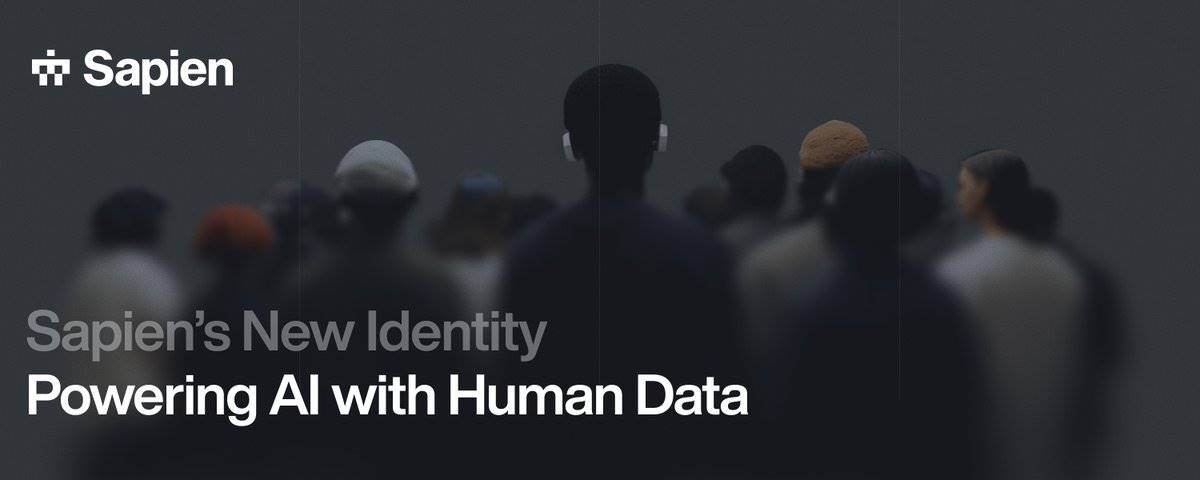
Collaborating with Alibaba and Amazon: Truly Implementing Web3 Data Solutions
In the past two years of the Crypto + AI boom, you may have seen many Web3 AI data projects. Most of them have used the two hot narratives of "blockchain" and "AI" to attract market attention and capital investment, but very few have been able to solve real problems and achieve a deep integration of technology and application, leading to a disillusionment with Web3 AI data projects in the market.
True adoption is also what distinguishes Sapien from other Web3 AI projects.
As an open, scalable, and decentralized data platform, Sapien can truly move from concept to implementation by providing high-quality data, empowering AI to optimize its development in multiple specific application scenarios.
Since its inception in 2023, in less than two years, Sapien has demonstrated strong growth potential and market recognition, with the number of platform users and business scale continuously expanding: not only does it have over 1.2 million registered users in 165 countries/regions, but the volume of completed data tasks on the platform has also exceeded 100 million.
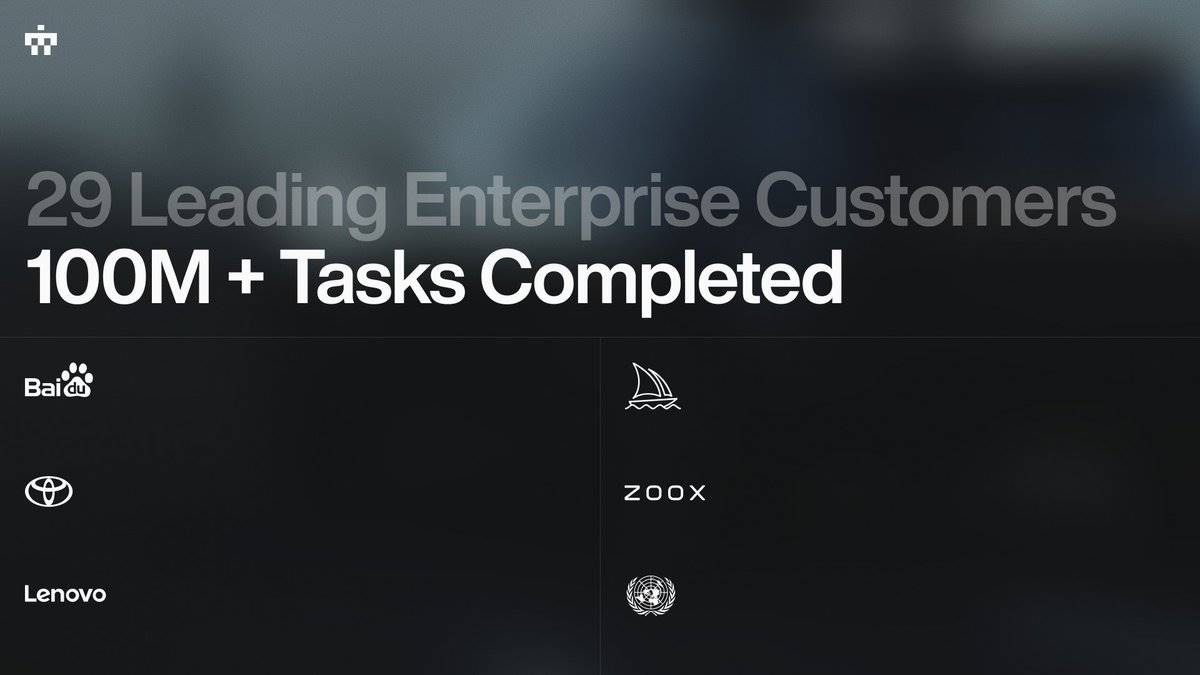
In terms of corporate partnerships, Sapien has also performed impressively. To date, Sapien has established deep partnerships with 27 enterprise clients, including well-known Web2 giants such as Amazon, Toyota, Alibaba, Baidu, and Lenovo. These collaborations not only further validate Sapien's technical strength and commercial value but also lay a solid foundation for its future sustainable development.
Of course, behind the clever integration of the project with the Web3 concept and its implementation in various real-world scenarios is a team composed of experts in the AI field and elites in cryptographic technology, who possess deep insights into the pain points of the AI market and a strategic vision for the potential of Web3 AI.
As the founder and CEO, Rowan Stone has extensive experience in the blockchain field and was one of the main contributors to Coinbase's Layer 2 project, Base. Now, he is focusing on the field of artificial intelligence, aiming to achieve the sharing and connection of human knowledge through Sapien, injecting momentum into the further development of AI.
Trevor Koverko is a co-founder of the on-chain digital securities platform Polymath, where he made pioneering contributions in the tokenization of real-world assets. He currently serves as the Chief Strategy Officer (CSO) of Sapien, focusing on applying decentralized trust models in the field of artificial intelligence to promote the trustworthiness and transparency of AI.
Henry Chen has rich experience in market operations; he is not only the Chief Operating Officer (COO) of Haller.ai (which is now publicly listed) but has also been responsible for business growth in several tech unicorn companies, including ClickUp, SAS, and Xsolla. As Sapien's COO, Henry is responsible for formulating the platform's market growth strategy and driving Sapien's global expansion.
Kelly Ryan, a graduate of the University of Waterloo, is an experienced product and engineering leader who previously worked at the startup FastAF, which received $80 million in support. She currently serves as Sapien's Chief Technology Officer (CTO), leading technology architecture and product development to provide strong support for the platform's technological innovation.
With the exceptional capabilities and collaborative spirit of this elite team, Sapien not only excels in technology and market performance but has also gained high recognition in the capital market. In October 2024, Sapien completed a $10.5 million seed round of financing, led by Variant, with participation from Primitive Ventures, Animoca, Yield Game Guild, and HF0.
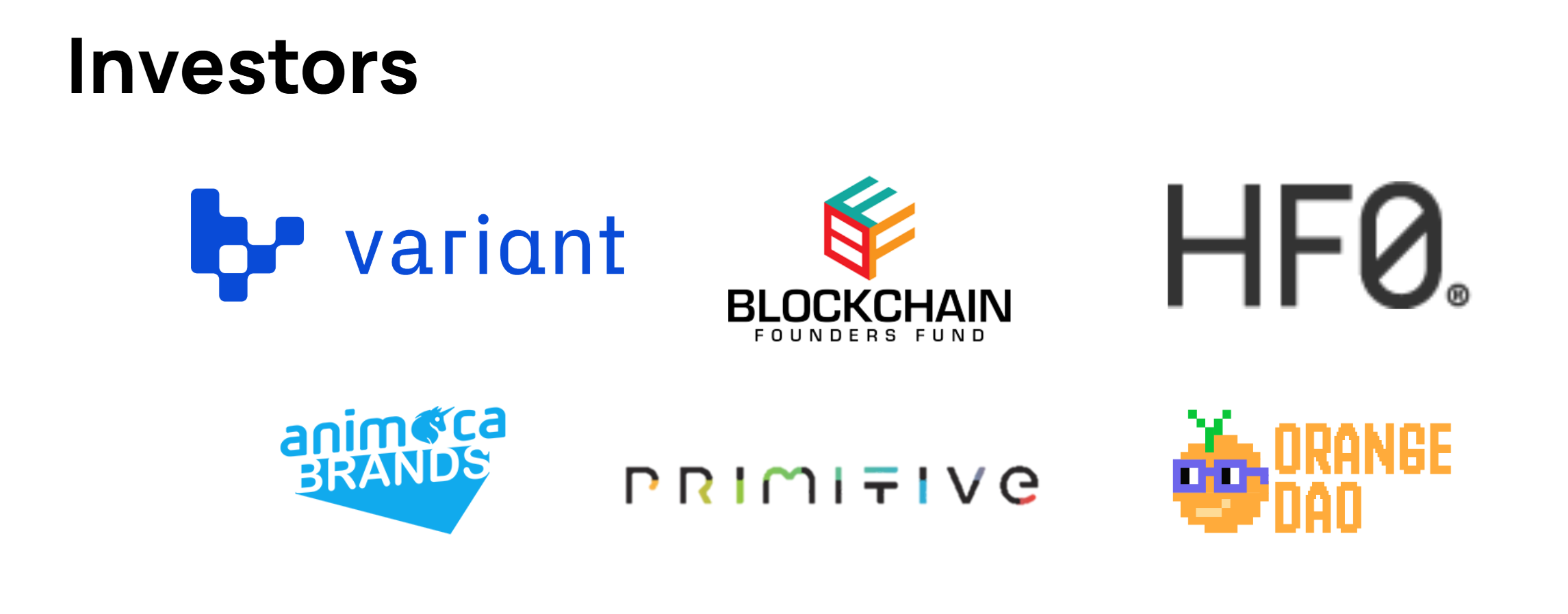
By accumulating a large number of users and partners to drive Web3 AI from concept to multi-scenario implementation, while also winning the favor of institutional capital, Sapien's clear business model and sophisticated operational logic are key to achieving all of this. So how is all of this accomplished?
Connecting Data Contributors, Annotators, and AI Projects to Build a High-Quality Data Distribution Center
When it comes to Web3 AI data services, many people may immediately have a stereotype: is this a data labeling platform driven by token economics?
It is important to clarify that data labeling is part of Sapien's business, but Sapien's services go far beyond that.
In simple terms, the core of Sapien's operation revolves around "high-quality data."
Users can contribute in two major ways through Sapien:
On one hand is data contribution: Users can contribute various types of data, including text, voice, images, videos, and even specialized knowledge. Beyond general data, Sapien's data contribution system can also provide customized data services. For example, AI in the medical field requires specialized and high-quality training data; doctors can contribute medical data through Sapien to assist in the development of medical AI while receiving rewards. With a base of 1.2 million registered users, Sapien will provide new data for AI development across various industries.
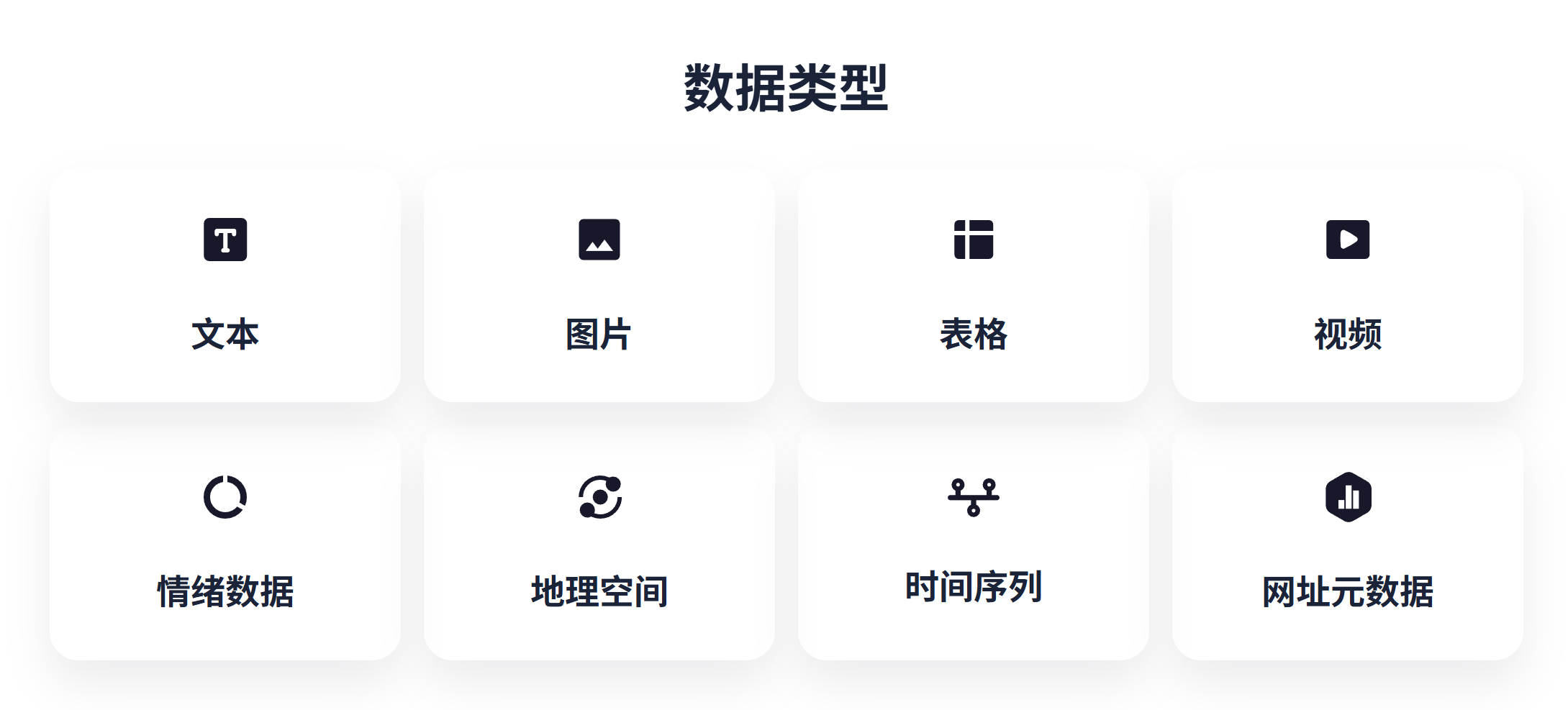
On the other hand is data annotation: Anyone from any country/region can participate in a decentralized manner. This contribution is similar to data labeling but is more advanced, because Sapien can integrate artificial intelligence and human intelligence to collect and annotate all types of inputs for any model, while endowing AI with the perception and understanding of language and context.
For example, when annotating text data, Sapien supports providing questions and answers based on the context and content of the text, thereby offering seamless and natural responses for chatbots. Additionally, by annotating the text to determine the emotions expressed (positive, negative, or neutral), it further deepens AI's understanding.
Another example is that Sapien supports recognizing and distinguishing different objects, features, or areas in images and categorizing them into different classes, such as labeling people, cars, buildings, etc., in a picture. This higher-dimensional data processing provides higher quality data for AI training.
We can feel the difference of Sapien's data through a vivid collaboration case: in the field of autonomous vehicles, Toyota provided Sapien with a dataset from its self-driving cars. Sapien users delved into these 3D data and annotated them, helping the model understand the position of the car in time and space, as well as the scenarios it faces, thus achieving safe driving.
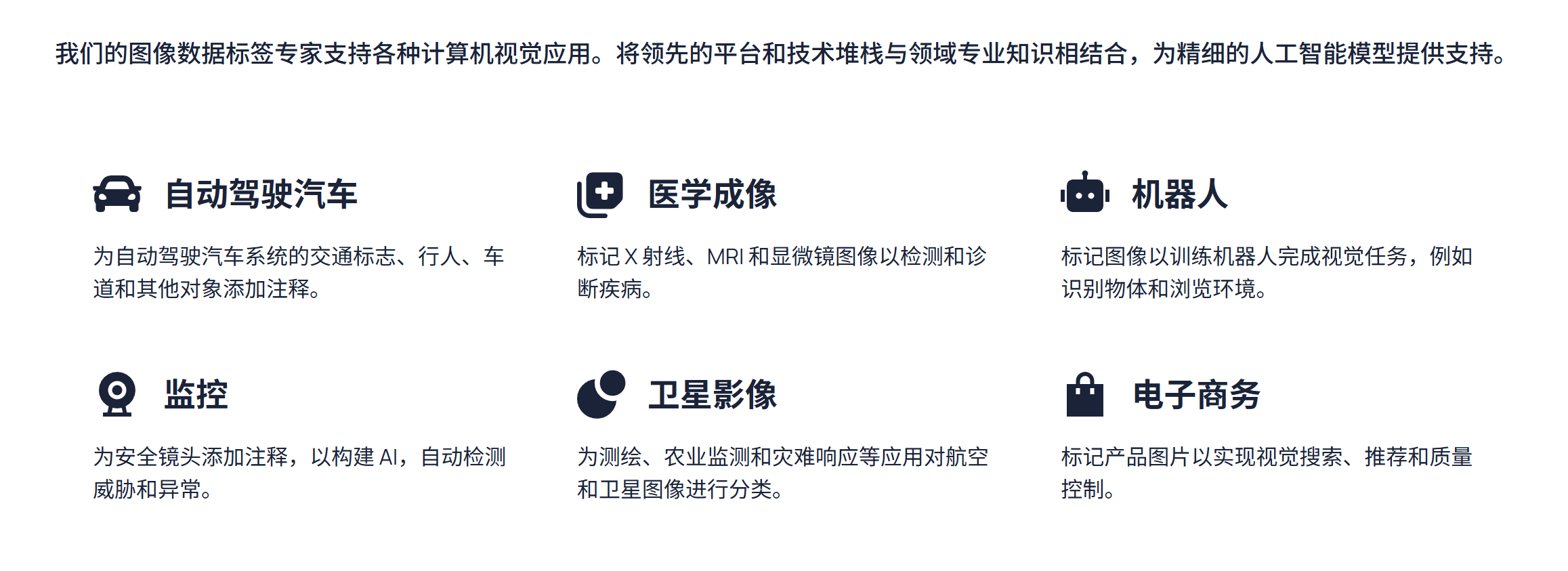
On this foundation of higher quality data, Sapien easily connects data contributors, data processors, and AI projects, becoming a data resource center for the AI industry and a distribution center for high-quality AI data:
For data contributors: Anyone can upload data, contributing to AI development while receiving rewards;
For data processors: Anyone can participate in data processing, contributing to AI development while receiving rewards;
For AI projects: Obtain higher quality data at a lower cost, achieving rapid development of AI.
At the same time, leveraging the power of blockchain, all contributions are recorded and managed on-chain, achieving labor-based distribution and avoiding issues of unequal profit distribution caused by intermediary exploitation.
In the report "Unlocking the Chinese AI Data Market: Trends, Challenges, and Opportunities" released by Sapien in May, it was also pointed out that the foundation of any powerful AI system lies in the data used to train it. High-quality data has broad application prospects in automatic speech recognition (ASR), financial activities, autonomous vehicles, robotics, educational technology, and large language models (LLM).
Under the premise of logical validity, ensuring high-quality data contributions and widely mobilizing the enthusiasm of multiple participants becomes the core test for the successful operation of the Sapien platform.
All of this will be further realized through a decentralized task platform based on the SPN token.
Staking, verification, and matching are interconnected: the higher the quality, the higher the rewards.
In simple terms, the core logic of the Sapien decentralized task platform is: register on the task platform → choose a task → complete the task → receive rewards.
The SPN token, as Sapien's native token, plays an important role in ecological incentives.
In this process, how can we ensure that users truly complete tasks with high quality? Sapien addresses this issue by introducing a staking mechanism and an on-chain reputation system.
Users who want to participate in tasks need to stake SPN tokens as collateral;
After completing the task, it will enter a peer review stage, where high-reputation users review the task quality of low-reputation users;
If the task is completed with high quality, the user will receive rewards and improve their reputation;
If the task is completed with low quality, the staked tokens will be forfeited, and it will also affect their future task permissions;
Through continuous evaluation of users' task completion, a comprehensive on-chain reputation system emerges: on one hand, users with higher reputations will unlock more task permissions and receive more rewards, while richer rewards will attract more users to join in and work on tasks to enhance their reputations, forming a positive cycle within the ecosystem; on the other hand, based on users' reputations and task completion status, Sapien will also screen and certify users to establish clearer user profiles, achieving precise matching between tasks and users, thereby further enhancing the operational efficiency of the entire ecosystem.
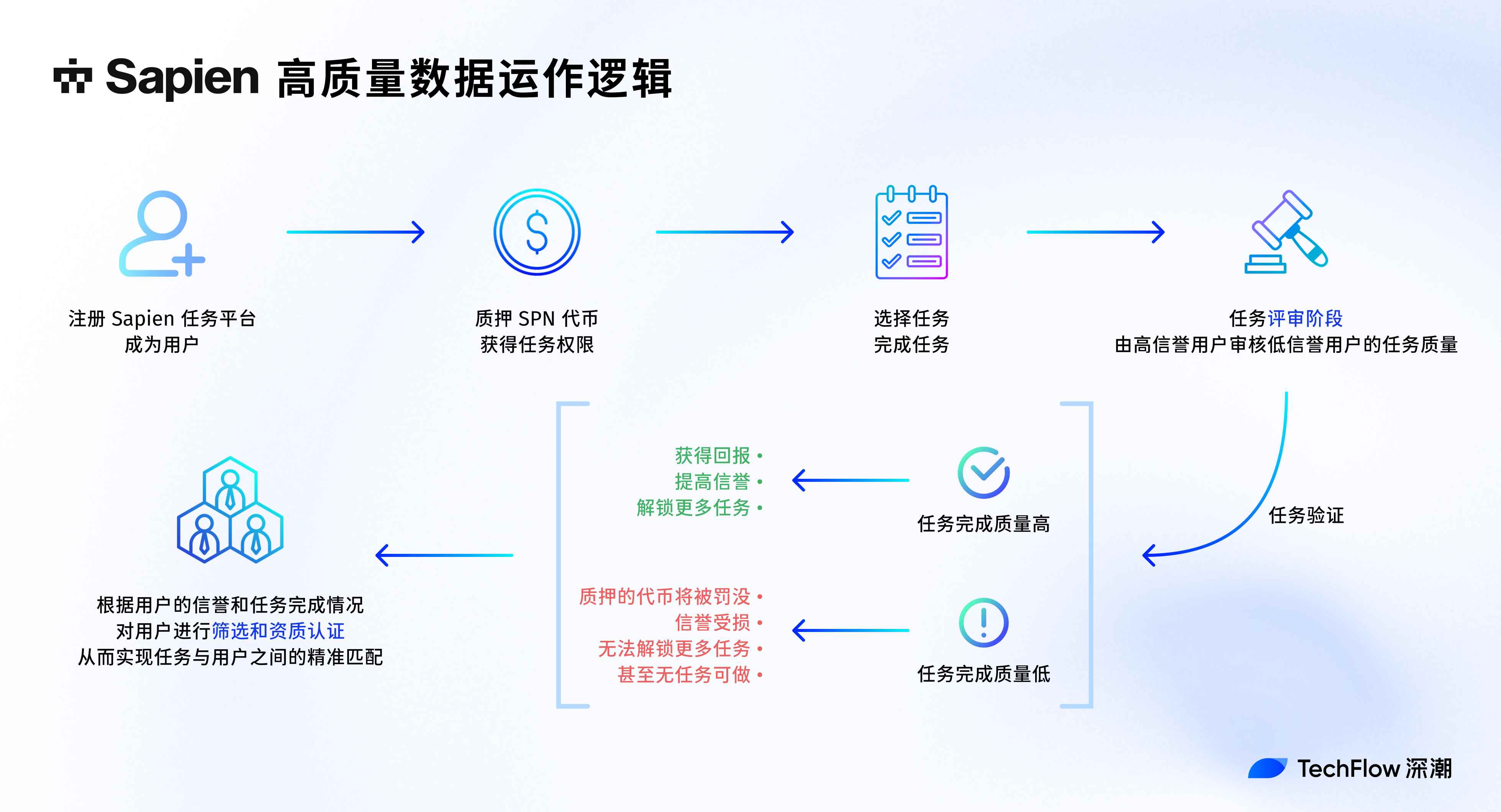
With a global scale of 1.2 million registered users and dozens of top enterprises adopting it, the feasibility of Sapien's high-quality AI training data solution is well demonstrated in terms of data dimensions. So how can one better participate in it while the mainnet and TGE have not yet launched?
Cookie x Sapien Special Event Ongoing, Earn Points to Accumulate Airdrop Chips
Sapien has just concluded the third phase of the Sapien Squad, which aims to collaborate with top projects in the Ethereum and Base ecosystems, including Uniswap, AAVE, Morpho, Pendle, etc. If users registered on Sapien hold eligible tokens at the time of the snapshot, they will have the opportunity to earn badges and receive future airdrops from allies.
However, if you missed the third phase of the Sapien Squad, there's no need to worry. Before the TGE, the most direct way is to participate in tasks to earn points.
Currently, on the Sapien official website, there are three sections where points can be earned: the task panel, the points panel, and the training center.
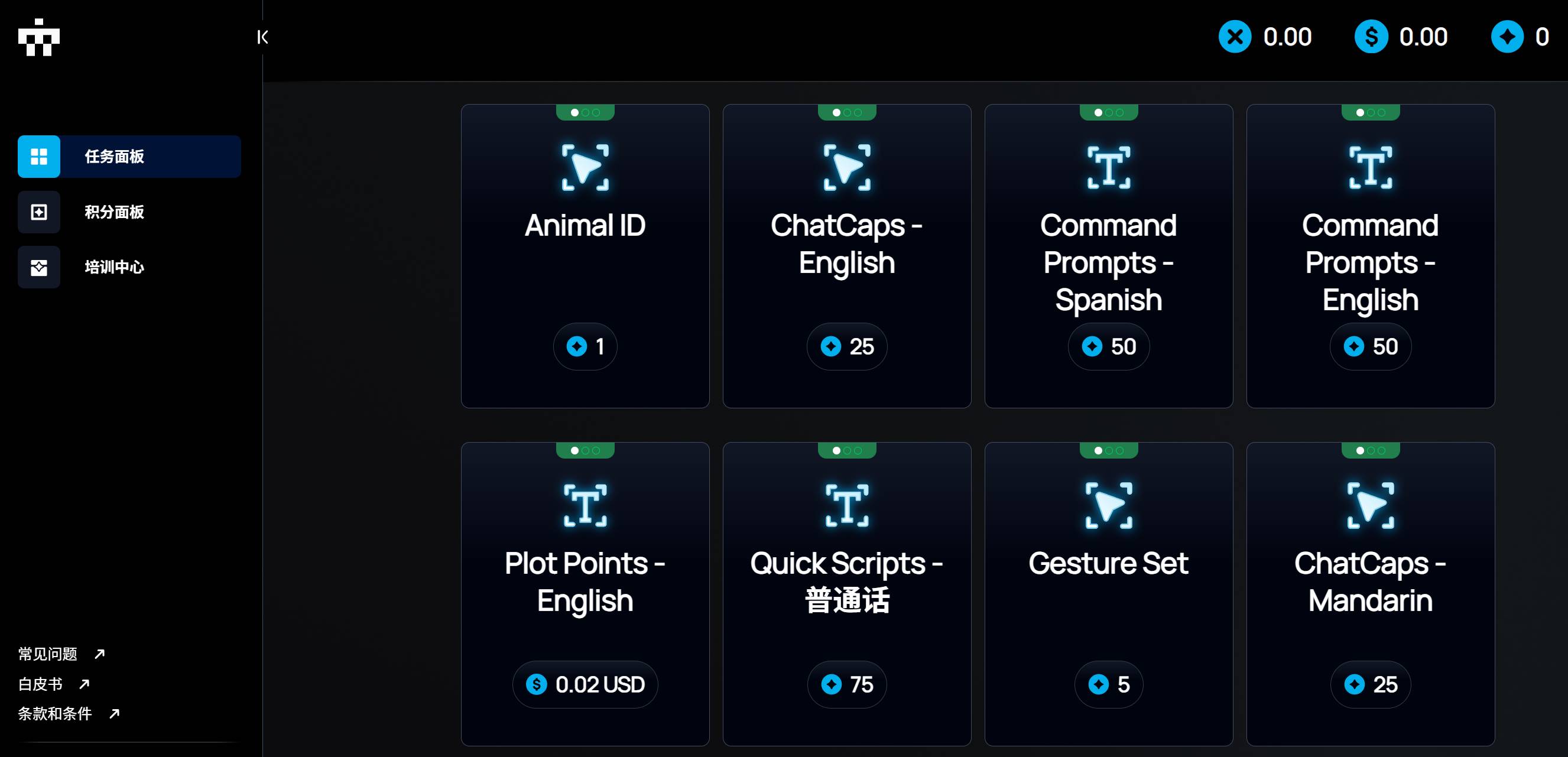
The task panel is where data tasks are displayed, allowing users to choose tasks based on time, task type, and task points. In the future, Sapien will continuously launch more tasks.
The points panel is where Sapien guides users to learn more about the platform. Users can earn 100 - 500 points by completing tasks such as following Twitter, binding Twitter, connecting Farcaster, and binding World ID.
The training center provides users with introductory videos and tutorials. By watching these videos and tutorials, users can earn point multipliers and point rewards.
Points serve as proof of participation in Sapien and as chips for future SPN token earnings, which can be exchanged for SPN tokens during the official TGE.
At the same time, the Cookie DAO's Sapien-themed SNAPS event is also ongoing. After registering an account on the Cookie.fun platform, users can post tweets on X platform with tags like #Sapien and #snaps to introduce Cookie DAO and Sapien, helping to expand the project's influence, and in the future, they will share 0.5% of the SPN token supply.
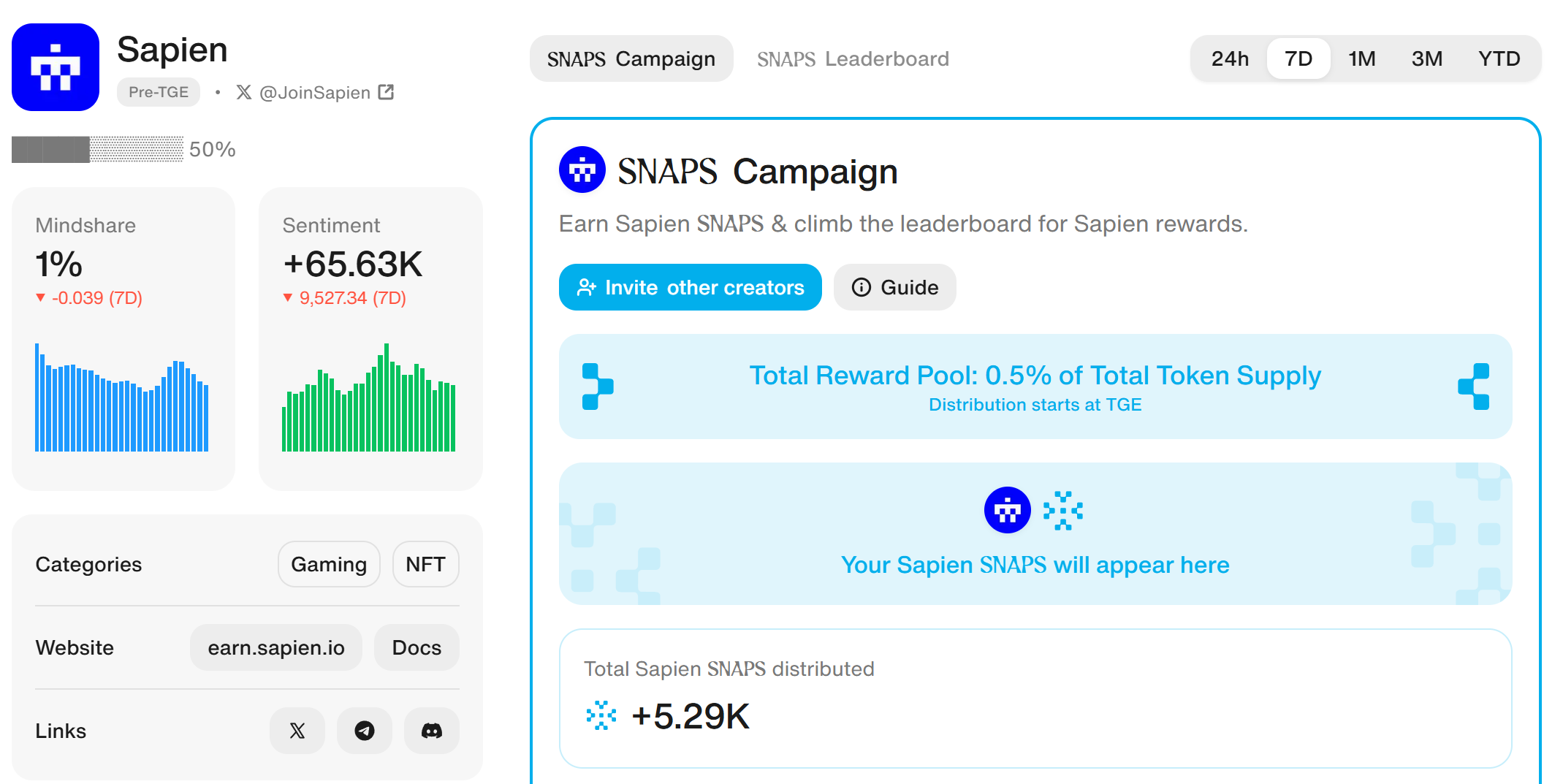
Additionally, to maintain the orderly growth and healthy sustainable development of the entire ecosystem, Sapien has also designed an invitation fission mechanism and staking rewards.
In the staking mechanism, the longer the staking period, the higher the point multiplier: users who choose a 1-month lock-in period will receive a 1.05x reward multiplier; those who choose a 3-month lock-in period will receive a 1.10x reward multiplier; those who choose a 6-month lock-in period will receive a 1.25x reward multiplier; and those who choose a 12-month lock-in period will receive a 1.50x reward multiplier.
In the invitation mechanism, the more new ecosystem participants a user invites, the higher the rewards they can receive, with a maximum of 5% of the rewards of their referrals.
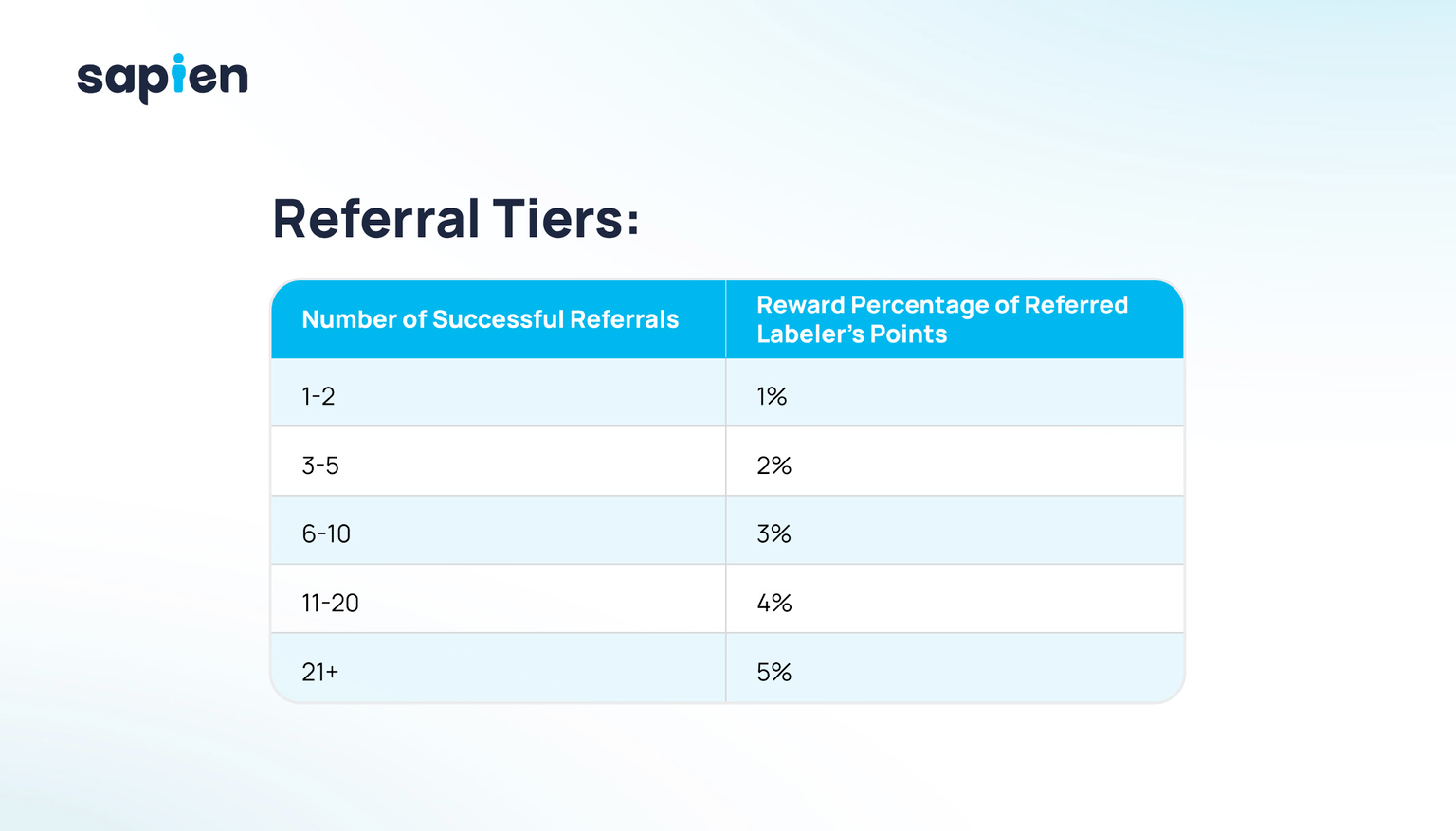
Conclusion
Data is the new electricity, and this is an undeniable consensus.
Focusing on providing high-quality AI training data for AI development, Sapien is the power station in this data revolution, encouraging global users to participate in data contributions and receive rewards based on contribution quality, thus solving the AI data dilemma. Sapien's mission is not just to train machines but to coordinate global intelligence, allowing AI to truly serve the interests of all humanity.
It is worth mentioning that on July 7, 2025, Sapien announced a brand refresh, and upon visiting Sapien's official Twitter, the progress bar on its introduction page changed from 40% to 50%. Many community members speculate that this progress bar hints at important project milestones (mainnet and TGE).
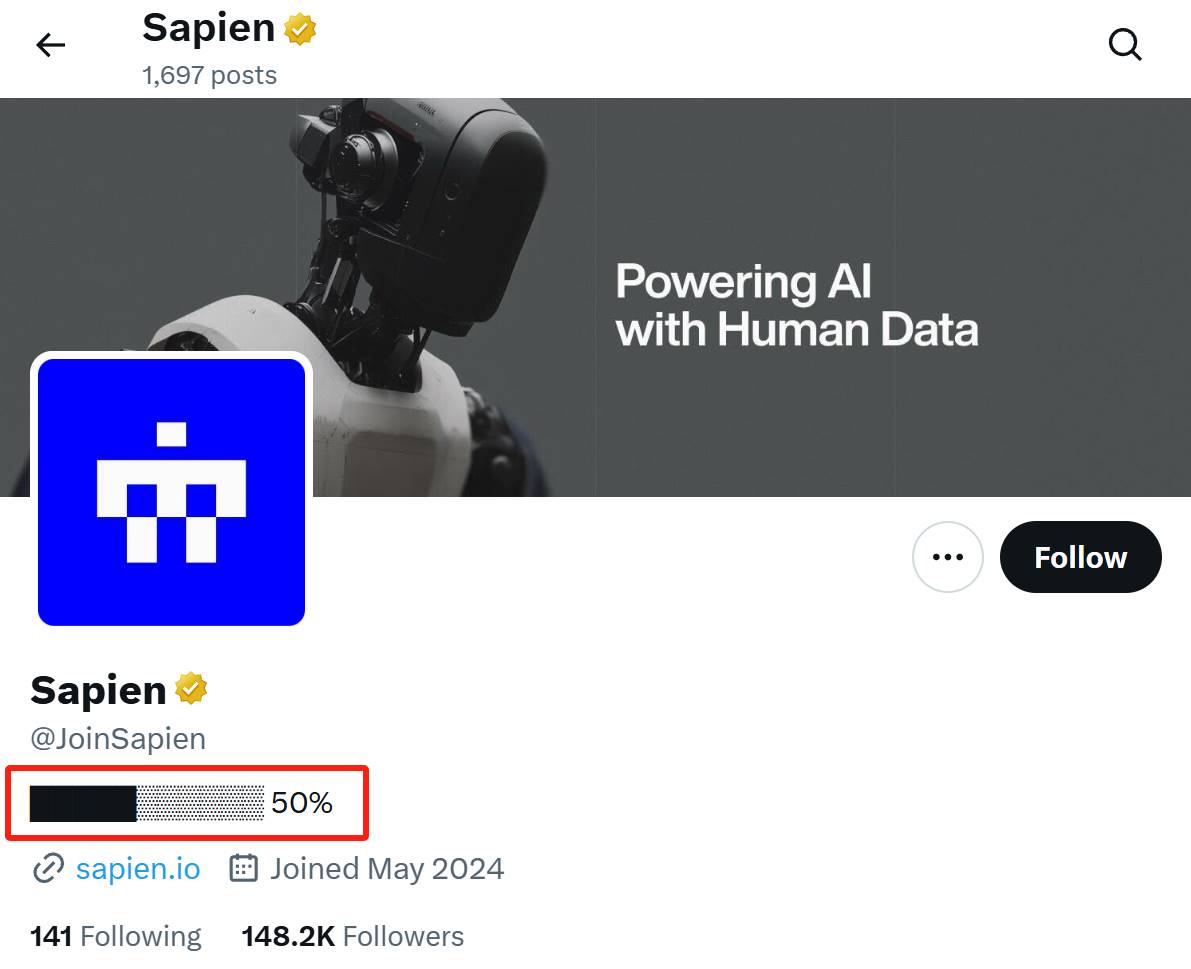
According to the roadmap disclosed in Sapien's official documents, 2025 will be a key year for its development. Sapien's work focus includes the mainnet launch (covering the reputation system and user qualification certification), token TGE (Token Generation Event), and further promoting the continuous growth of data contributors in the ecosystem while attracting more enterprise-level partners to join. With the project's brand image being refreshed, the orderly advancement of the points program, and the continuous expansion of the ecosystem scale, we look forward to Sapien redefining the rules of data sharing and value creation with high-quality data as a lever, becoming an important force in driving AI development.
免责声明:本文章仅代表作者个人观点,不代表本平台的立场和观点。本文章仅供信息分享,不构成对任何人的任何投资建议。用户与作者之间的任何争议,与本平台无关。如网页中刊载的文章或图片涉及侵权,请提供相关的权利证明和身份证明发送邮件到support@aicoin.com,本平台相关工作人员将会进行核查。




